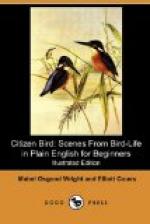“Why, of course I do,” said Dodo. “But if Shrikes eat birds, aren’t they very bad Citizens?”
“I do not wonder that you think so, my lassie; and so they would be if they ate birds only; but the Shrike earns his right to be thought a good Citizen by devouring mice and many kinds of insects, like beetles, which injure orchards and gardens. The comparatively few birds that he destroys are mostly seed-eaters—not the most valuable kinds to the farmer.
“In fact, the Shrike is especially useful in helping us to drive out the greedy, quarrelsome English Sparrow. This disreputable tramp not only does no work for his taxes—he hates honest work, like all vagrants —but destroys the buds of trees and plants, devours our grain crops, and drives away the industrious native birds who are good Citizens; so the Wise Men, who have tried the Sparrow’s case, say that he is a very bad bird, who ought to suffer the extreme penalty of the law.
“For this reason we must forgive the Shrike if he takes a few other birds when he is hungry and in a hurry. He has a strange habit which has earned for him the name of Butcher Bird. If at any time he secures more food than he needs for his immediate use, he puts it by to keep in ’cold storage’ by hanging it on the frozen twigs of a tree or thorn bush. Heart of Nature has doubtless taught him this habit through hard experience. Where the Shrike spends his winters, the food-supply is variable; it may snow for days and days, when he can find nothing to eat; so he has learned to store up provisions when the hunting is good, and of course such a thrifty bird may sometimes save up more than he really needs.
“You may know this Shrike on sight without hearing him sing—and perhaps you do not expect a cannibal bird to be a singer. But in late March and early April, when he is about to take his homeward journey to the North, he often warbles beautifully, and even brings in some mocking notes, until you would think that a Catbird, Thrasher, or Mockingbird must have wandered from the South too soon; and if you ever happen to see a Shrike and a Mocker close together, you may mistake one for the other, they look so much alike at a little distance.”
“I never knew that there were nice birds around in winter,” said Nat. “I thought all the country was good for then, was for coasting and skating! I wish I could stay here a whole year, Uncle Roy.”
“Stranger things have happened,” said the Doctor, looking at Olive with a twinkle in his eye that the children did not see.
The Great Northern Shrike
Length about ten inches.
Upper parts bluish-gray, with a broad black stripe along the side of the head to behind the eye. Black wings with a large white spot on each. Black tail with white tips to the outside feathers.
Lower parts grayish-white, faintly barred with darker. A great strong beak, hooked like a Hawk’s.
Only a Winter Visitor in the United States—a Summer Citizen of the far North.




